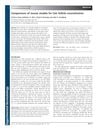 25 citations,
August 2017 in “Animal Biotechnology”
25 citations,
August 2017 in “Animal Biotechnology” Researchers found that certain RNA molecules might play a role in the growth of Cashmere goat hair.
 25 citations,
March 2017 in “Archives of Dermatological Research”
25 citations,
March 2017 in “Archives of Dermatological Research” Sinapic acid may help hair growth by activating a specific cell pathway.
 25 citations,
March 2017 in “Experimental Dermatology”
25 citations,
March 2017 in “Experimental Dermatology” The document concludes that understanding hair follicles requires more research using computational methods and an integrative approach, considering the current limitations in hair treatment products.
 25 citations,
July 2016 in “The journal of investigative dermatology/Journal of investigative dermatology”
25 citations,
July 2016 in “The journal of investigative dermatology/Journal of investigative dermatology” Imiquimod cream activates hair follicle stem cells and causes early hair growth by changing immune cells and certain protein expressions.
25 citations,
January 2015 in “World journal of stem cells” Hair follicle stem cells can become different cell types and may help treat neurodegenerative disorders.
 25 citations,
November 2014 in “British Journal of Dermatology”
25 citations,
November 2014 in “British Journal of Dermatology” Certain transporters are found in human hair follicles and may affect hair growth and loss.
 25 citations,
March 2014 in “Experimental Dermatology”
25 citations,
March 2014 in “Experimental Dermatology” Leptin helps start the growth phase of hair.
 25 citations,
August 2010 in “Journal of Biological Chemistry”
25 citations,
August 2010 in “Journal of Biological Chemistry” Nuclear Factor I-C is important for controlling hair growth by affecting the TGF-β1 pathway.
25 citations,
December 2007 in “Developmental biology” Clim proteins are essential for maintaining healthy corneas and hair follicles.
 24 citations,
April 2020 in “Cells”
24 citations,
April 2020 in “Cells” DNA methylation and long non-coding RNAs are key in controlling hair growth in Cashmere goats.
 24 citations,
November 2019 in “Experimental Dermatology”
24 citations,
November 2019 in “Experimental Dermatology” PPAR-γ is important for healthy hair and its problems, and more research on PPAR-γ treatments is needed.
24 citations,
September 2019 in “Experimental cell research” BMP2 helps hair follicle stem cells become specialized by increasing PTEN, which causes autophagy.
 24 citations,
October 2017 in “Scientific reports”
24 citations,
October 2017 in “Scientific reports” Changing light exposure can affect hair growth timing in goats, possibly due to a key gene, CSDC2.
 24 citations,
November 2013 in “Trends in pharmacological sciences”
24 citations,
November 2013 in “Trends in pharmacological sciences” Increasing ABC transporters in hair follicles may prevent chemotherapy-induced hair loss.
 24 citations,
August 2011 in “Experimental Dermatology”
24 citations,
August 2011 in “Experimental Dermatology” The flap assay grows the most natural hair but takes the longest, the chamber assay is hard work but gives dense, normal hair, and the patch assay is quick but creates poorly oriented hair with some issues.
 24 citations,
February 2006 in “Chinese Medical Journal”
24 citations,
February 2006 in “Chinese Medical Journal” Cultured dermal papilla cells can regenerate hair follicles and sustain hair growth.
24 citations,
November 2003 in “The FASEB Journal” Epimorphin helps start hair growth in mice.
 24 citations,
January 2003 in “Journal of Investigative Dermatology”
24 citations,
January 2003 in “Journal of Investigative Dermatology” Blocking a specific receptor slows down hair loss in mice.
24 citations,
February 2002 in “The journal of investigative dermatology/Journal of investigative dermatology” Two new proteins, hKAP1.6 and hKAP1.7, are found in the hair follicle cortex.
 24 citations,
November 1978 in “Biochemistry”
24 citations,
November 1978 in “Biochemistry” α-type filaments in guinea pig hair follicles have unique structural features.
 23 citations,
January 2021 in “Scientific Reports”
23 citations,
January 2021 in “Scientific Reports” Adding human blood vessel cells to hair follicle germs may improve hair growth and quality.
 23 citations,
December 2020 in “Frontiers in Cell and Developmental Biology”
23 citations,
December 2020 in “Frontiers in Cell and Developmental Biology” Gene network oscillations inside hair stem cells are key for hair growth regulation and could help treat hair loss.
 23 citations,
January 2018 in “International Journal of Molecular Medicine”
23 citations,
January 2018 in “International Journal of Molecular Medicine” Baicalin helps hair growth by activating specific cell signals and pathways.
23 citations,
January 2018 in “BMC genomics” Vimentin is involved in regulating the hair growth cycle in Inner Mongolian Cashmere goats.
 23 citations,
September 2017 in “The journal of investigative dermatology/Journal of investigative dermatology”
23 citations,
September 2017 in “The journal of investigative dermatology/Journal of investigative dermatology” NF-κB is crucial for different stages and types of hair growth in mice.
 23 citations,
December 2013 in “Regenerative Medicine”
23 citations,
December 2013 in “Regenerative Medicine” Hair follicle culture helps develop new treatments for hair loss.
 23 citations,
June 2012 in “PLOS ONE”
23 citations,
June 2012 in “PLOS ONE” KLF4 is important for maintaining skin stem cells and helps heal wounds.
 23 citations,
July 2007 in “The journal of investigative dermatology/Journal of investigative dermatology”
23 citations,
July 2007 in “The journal of investigative dermatology/Journal of investigative dermatology” Hair follicle bulge cells don't help skin regrow after glucocorticoid damage; interfollicular epidermis cells do.
23 citations,
December 2001 in “Experimental dermatology” Soymilk can slow hair growth and make hair thinner.
 23 citations,
May 1998 in “Journal of Dermatological Science”
23 citations,
May 1998 in “Journal of Dermatological Science” Insulin or IGF-I is needed for hair growth in newborn mice, while minoxidil helps adult mouse hair grow, suggesting a way to study human hair loss.























